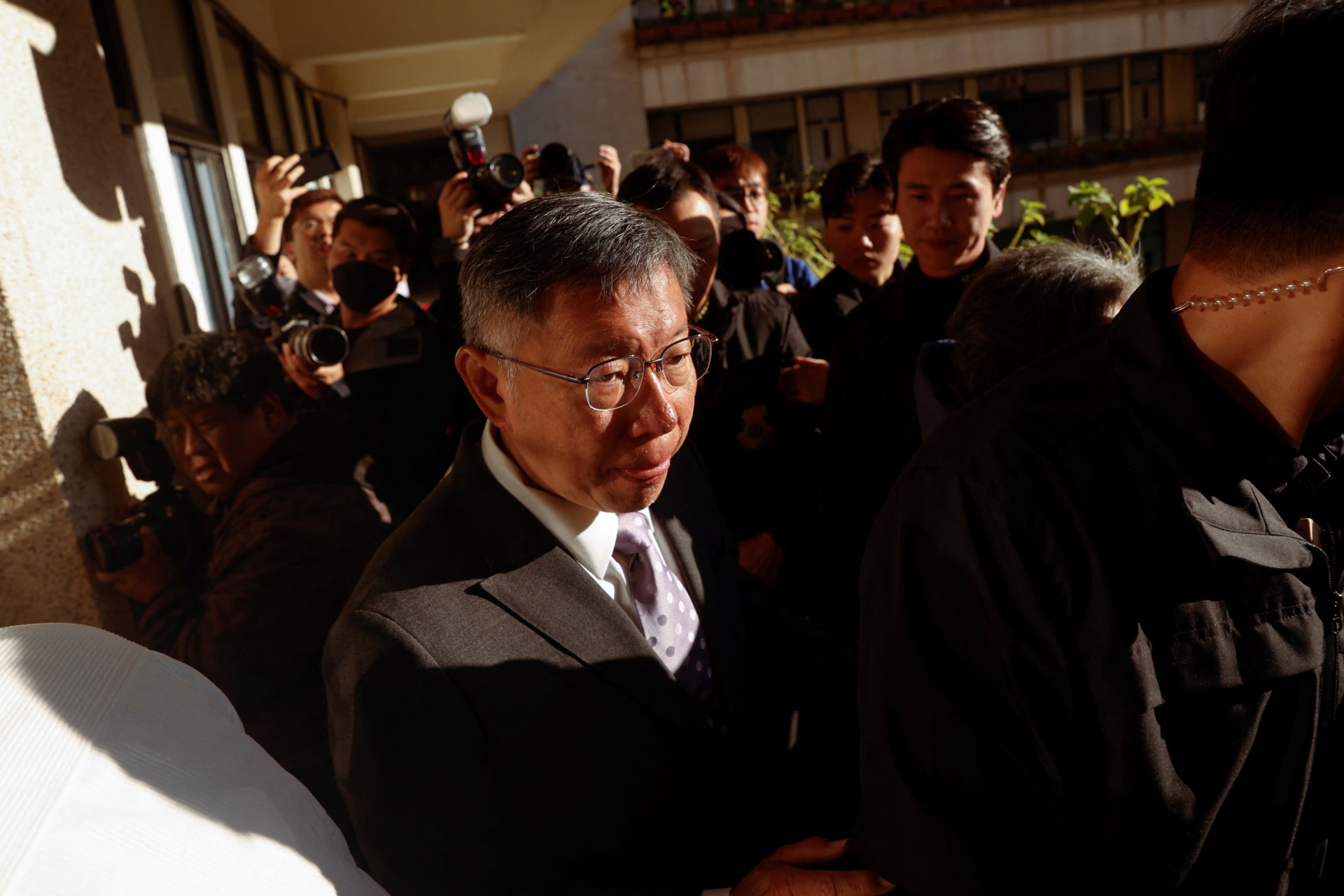Can the Taiwan People’s Party Survive?
Mounting scandals surrounding the Taiwan People’s Party raise questions about its long term viability.

The ongoing corruption investigation into Ko Wen-je, the founder and leader of the Taiwan People’s Party (TPP) and a candidate in Taiwan’s most recent presidential election, has sent shockwaves through Taiwan, raising questions about the party’s future and whether the tumult will influence the island’s political dynamics. While the TPP only occupies eight seats in Taiwan’s legislature, it controls the balance of power, as neither of the two largest parties, the ruling Democratic Progressive Party (DPP) or the Kuomintang (KMT), hold an outright majority. As scrutiny of Ko and the TPP intensify, dynamics in the legislature could shift, with implications for President Lai Ching-te’s agenda.
What Are the Accusations Against Ko and the TPP?
As of now, the corruption investigation into Ko centers on whether he used his power as Taipei mayor to increase the floor area ratio (the ratio of a building’s total floor area to the size of the parcel of land it occupies) of the Core Pacific City redevelopment project from 392 percent to 840 percent. Such a change would have enabled developers to reap billions in additional profit (for more on the allegations, see this helpful article from Taiwan’s Central News Agency). Last week, investigators searched dozens of locations, including Ko’s residence and the TPP headquarters, brought Ko in for questioning, and detained him. On Monday, the Taipei District Court ordered that Ko be released but reversed itself just days later and ruled that Ko be detained again.
Separately, the TPP is embroiled in questions surrounding potential campaign finance violations. On August 12, seeking to get ahead of this story, the party held a press conference and admitted that it had failed to report or misreported expenses totaling more than NT$18 million ($560,000). Then, the Control Yuan announced the result of its audit, which found that the TPP had raised NT$84.3 million ($2.6 million) last year but did not report any campaign expenses. Large entries in the party’s financial reports for mundane items have since raised eyebrows.
But this could be just the tip of the iceberg, as nearly every day there seems to be new revelations and additional allegations against Ko and the TPP. For those who want to read more about the TPP’s cascading issues, Courtney Donovan Smith has an in-depth series in the Taipei Times (Part One, Part Two, Part Three, Part Four). Brian Hioe also has a useful rundown in New Bloom and another piece in The Diplomat.
Amidst these troubles, Ko has taken a three-month leave of absence from the chairmanship of the TPP. Huang Shan-shan, one of the party’s most prominent politicians who also led Ko’s presidential campaign, was suspended from the party for three years, although she has retained her seat in the legislature. But the TPP’s issues did not start here; in late-July, Hsinchu Mayor Ann Kao was suspended from her position and expelled from the party after being convicted of corruption and sentenced to over seven years in prison.
Despite these troubles, Ko remains defiant, accusing the government of attempting to “suppress” its opponents and the press and judiciary of “being the government’s political tools.” He has also expressed confidence in the party’s future, remarking, “We believe that our party has the ability to cope with all the crises.”
Ko’s statements notwithstanding, the TPP’s issues go far deeper than a single scandal or person and the past few months reveal deeply-rooted, systemic problems within the party. All of this raises the question of whether the TPP will remain a viable political force or whether it will atrophy and disappear.
Can the TPP Survive?
While Ko lost the presidential election, the TPP was broadly seen as a party whose best days were ahead of it. Ko gained supporters by painting his party as the one dedicated to pragmatically solving Taiwan’s problems, in contrast to the DPP and KMT, which were beholden to special interests and lacked flexibility due to their ideology. As a presidential candidate, he built a base among energized young Taiwanese, receiving 3.69 million votes (26.5 percent). Although Ko lost the election, he was widely seen as having outperformed expectations and as someone who would again run for president.
But even before these scandals fully emerged, the TPP’s popularity was declining, while the ruling DPP’s standing was improving. According to a recent poll, over the past four months “good feelings” toward the TPP have declined from 31.6 percent to 21.9 percent, while “bad feelings” have shot up from 53.7 percent to 65.3 percent. Over this same period, President Lai’s approval rating improved from 45.2 percent to 54.4 percent. Given that the poll occurred before these scandals snowballed, the trendlines will likely only worsen for the TPP.
The TPP could soon face an existential crisis because, unlike Taiwan’s two major parties, it cannot appeal to its supporters to put these issues aside and instead prioritize their pursuit of a shared ideological objective; indeed, one of Ko’s selling points was that the TPP was a nonideological party that could deliver clean governance, a pledge that these scandals prove to be hollow. As Nathan Batto, one of the foremost experts on Taiwanese politics, has written, “When the DPP, for example, was accused of widespread corruption at the end of the Chen [Shui-bian] presidency, their supporters remained loyal because the DPP was the champion of Taiwanese nationalism. If the TPP becomes tarnished with the image of corruption, their supporters don’t have any similar reasons to remain loyal.”
While it is far too soon to write off the TPP, which has years to reset before the next elections, its support will likely decline. The question, then, is whether those who leave the party turn to the KMT or DPP and how the party’s lawmakers vote in the legislature.
How Will Political Dynamics Change?
Although the TPP controls eight critical seats in the Legislative Yuan, to this point it has surprisingly not sought to leverage its position to play the DPP and KMT off one another, working with the DPP on some issues and the KMT on others and in the process extracting benefits for the party. Instead, it has aligned with the KMT, pushing through a controversial plan to expand the legislature’s powers and questioning Lai’s proposed policies, including his plan to build additional submarines.
Going forward, the TPP’s legislators may continue this path, aligning with the KMT on key issues and hoping that by the next election most voters will have forgotten about these scandals. If the party continues to lean into the framing that the DPP is orchestrating these investigations in an attempt to wipe out the TPP, its lawmakers may be even less likely to cooperate with the ruling party even when their interests align. This would further coarsen Taiwan’s politics and make it far more difficult for Lai to govern. On the other hand, if these legislators conclude that the TPP’s days are numbered, they may become free agents open to working with the DPP. As of now, too much is unknown and unsettled to have a sure sense of how the TPP’s troubles will influence domestic politics. One thing for sure, though, is that Taiwanese politics will become even more interesting.
This publication is part of the Diamonstein-Spielvogel Project on the Future of Democracy.
